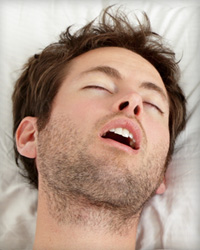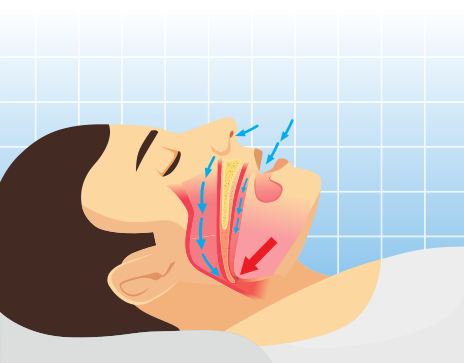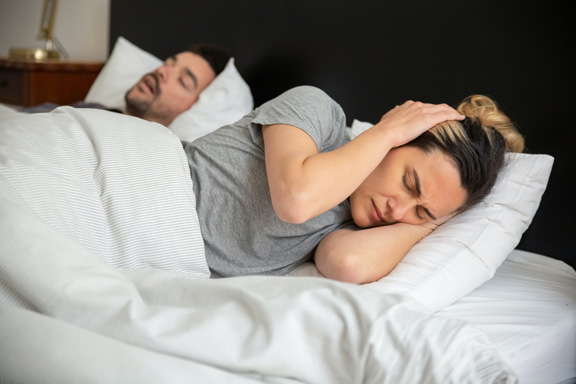Sleep Apnea and Snoring Treatment in South San Francisco
Snoring can be extremely disruptive to both your natural sleep cycle and to your family members. Sleep apnea is a very common cause of that snoring, and it affects many Americans. Not only does it often cause heavy snoring, but it can also cause serious complications with breathing.
A pause in your breathing, referred to as an “apnea,” can sometimes occur anywhere from a few times in one hour to as many as hundreds during the night—and it can go unnoticed for years! Diagnosing and treating sleep apnea can make an enormous difference to your overall health.
Do I Have Sleep Apnea?
Not every person who snores at night suffers from sleep apnea. It’s important to see a sleep professional to determine if you are truly affected by this condition. Often, sleep apnea symptoms can be ignored for years and not taken seriously, especially because sleep apnea is nearly impossible to self-diagnose.
If your family members have mentioned snoring or any of the following signs, consider consulting with a qualified sleep doctor for further analysis. Call us in Daly City today—don’t wait any longer to find out if you are suffering from sleep apnea or another sleep disorder!
Sleep Apnea Symptoms

- Abnormal pauses in your steady breathing.
- Very shallow breathing.
- Feeling unusually tired throughout the day.
- Waking up with a headache.
- Insomnia from sleep disruption.
Medical studies have reported that long-term sleep apnea can have a very dangerous effect on body systems, and cause additional health issues, including a serious decline in liver functions.
What Is Involved With Diagnosing Sleep Apnea?
There are many different reasons for disturbed sleep. Begin by talking with your primary care physician about your symptoms.
Often a team of doctors are involved in determining sleep disorders, including pulmonologists, neurologists, or other physicians with specific sleep training. Several tests are available for diagnosing sleep apnea and other sleep disorders.
The American Sleep Apnea Association has created the following survey to help you decide whether or not you are at risk for sleep apnea:
- Are you a loud or regular snorer?
- Have you ever been observed to gasp or stop breathing during sleep?
- Do you feel tired or groggy upon awakening?
- Do you wake up with a headache?
- Are you often tired during the day?
- Do you fall asleep while sitting, reading, watching TV, or driving?
- Do you have problems with concentration or memory?
You can also rate your sleepiness using the Epworth Sleepiness Scale.
Sleep Apnea Test Options
 Polysomnography—often referred to as a sleep study—is a test used in diagnosing sleep apnea. It records a variety of body functions during sleep, such as the electrical activity of the brain, eye movement, muscle activity, heart rate, respiratory effort, airflow, and blood oxygen levels. These tests are used both in diagnosing sleep apnea and determining its severity.
Polysomnography—often referred to as a sleep study—is a test used in diagnosing sleep apnea. It records a variety of body functions during sleep, such as the electrical activity of the brain, eye movement, muscle activity, heart rate, respiratory effort, airflow, and blood oxygen levels. These tests are used both in diagnosing sleep apnea and determining its severity.
The Multiple Sleep Latency Test (MSLT) measures the speed of falling asleep. The MSLT is useful in measuring the degree of excessive daytime sleepiness and can rule out other types of sleep disorders. In this test, patients are given several opportunities to fall asleep during the course of a day when they would normally be awake.
People without sleep problems usually take an average of 10–20 minutes to fall asleep. Individuals who fall asleep in less than 5 minutes are likely to require some treatment for sleep disorders.
Diagnostic tests for sleep disorders usually are performed in a sleep center, but new technology may allow some sleep studies to be conducted in a doctor’s office or the patient’s home.
Our South San Francisco area office in Daly City has the benefit of Pharyngometry Technology on site. Sound waves are used to measure the interior spaces of the mouth and throat. This information is valuable in diagnosing the source of your problem, and providing the best sleep disorder treatment for you.
Sleep Apnea Treatment
Dr. Hovden’s practice in Daly City near Pacifica is unique in offering a variety of oral dental appliances to better meet your individual needs, helping you achieve restful and quiet sleep.
In addition, we have the benefit of Pharyngometry Technology on site. With the information gathered through this equipment, we can determine the ideal treatment plant that will work specifically for you.
Dr. Hovden, DDS, will consider these factors in suggesting a specific snoring or sleep apnea dental appliance:
- Severity of sleep apnea.
- Size of soft palate and tongue.
- Jaw range of motion.
- Bite.
- Jaw structure.
- Teeth clinching or grinding.
- Health of teeth and gums.
The American Academy of Sleep Medicine has recognized oral appliance therapy as an effective first line treatment of choice for snoring and mild to moderate sleep apnea. Here are just some of the benefits of a sleep apnea dental appliance:
- Easy to tolerate | Nine in ten patients wear the sleep apnea dental appliance all night, every night! Unlike the CPAP sleep apnea machine, which patients sometimes find difficult to tolerate, compliance with an oral appliance is easy to achieve!
- Immediate results | Many patients experience relief the very first night the sleep apnea dental appliance is worn.
- Easily adjusted | Sleep apnea dental appliances are easily adjusted, making them comfortable. It is simple to maintain the best fit.
- Simple and effective | With Oral Appliance Therapy, there is no need for surgery, medication, or the CPAP sleep apnea machine.
Snoring and Sleep Disorders
Millions of people suffer with snoring—and their loved ones suffer, too! While everyone snores occasionally, frequent heavy snoring can affect the quality and quantity of your sleep. Poor sleep can lead to daytime fatigue, irritability, and increased health problems.
Discovering the causes of your snoring and finding the right cure can vastly improve your health, your relationships, and, of course, your sleep!
What Are Some Causes Of Snoring?
The muscles and tissues of the throat relax as sleep settles in, causing the airway to shrink. As the airway becomes smaller, the soft tissues begin to vibrate with inhaling and exhaling, causing snoring. Other common causes of snoring include:
- Age over 40 years old: As you reach middle age and beyond, your throat becomes more narrow, and the muscle tone in your throat decreases.
- Male: Men have a more narrow air passage than women do, and are more likely to snore.
- Family history of snoring and sleep apnea: A narrow throat, a cleft palate, enlarged adenoids, and other physical attributes (which contribute to snoring) can be hereditary. Some groups are at higher risk—such as Black, Hispanic, or Pacific Islander.
- Nasal and sinus problems: Blocked airways make inhalation difficult and create a vacuum in the throat, leading to snoring.
- Overweight: Fatty tissue and poor muscle tone contribute to snoring.
- Alcohol, smoking, and medications: Alcohol intake, smoking (or second-hand smoke), and certain medications are additional causes of snoring as they increase muscle relaxation.
- Sleep posture: Sleeping flat on your back can cause the soft tissues of your throat to relax and collapse, blocking the airway.
How do you distinguish between snoring and sleep apnea? The most important sign is how you feel during the day. Normal snoring doesn’t interfere with the quality of your sleep. If you suffer from extreme fatigue and sleepiness, you should check for sleep apnea.
Snoring and Sleep Disorder Treatment
 Behavioral Therapy | Several behaviors can cause sleep disorders. Using alcohol, tobacco and sleeping pills increase the likelihood that the airway will collapse during sleep. Being overweight can also negatively impact a collapsing airway. Even a 10% weight loss can reduce apnea episodes while sleeping.
Behavioral Therapy | Several behaviors can cause sleep disorders. Using alcohol, tobacco and sleeping pills increase the likelihood that the airway will collapse during sleep. Being overweight can also negatively impact a collapsing airway. Even a 10% weight loss can reduce apnea episodes while sleeping.
In some patients with mild sleep apnea, breathing pauses occur only when they sleep on their backs. Using pillows or other devices can help encourage a side sleeping position and can prove to be an effective sleep disorder and snoring treatment.
Surgery | Although several surgical procedures are used to treat sleep disorders by increasing the size of the airway, many of these procedures pose risks and vary in success. More than one procedure may need to be tried before the patient realizes any benefits from a surgical sleep disorder treatment.
Mechanical Therapy | Continuous Positive Airway Pressure (CPAP) is the most common treatment for sleep apnea. This method uses a CPAP machine, often called a sleep apnea machine.
The patient wears a mask over the nose during sleep, and pressure forces air through the nasal passages. The pressure is constant and continuous. While it can be effective as sleep disorder treatment, CPAP is difficult for many patients to tolerate, due to nasal irritation and drying, facial skin irritation, abdominal bloating, sore eyes, and headaches.
Dental Appliances | Oral appliances can be another alternative sleep disorder and snoring treatment. The dental appliances fit over the teeth and hold the lower jaw and tongue in a position to maximize air flow. A highly trained dentist, such as Dr. Ken Hovden in South San Francisco, can evaluate if you are a good candidate for sleep disorder treatment with a dental appliance.
Contact Kenneth Hovden, DDS, for Better Sleep Starting Today!
Contact us to schedule a consultation if you are concerned you may be suffering with sleep apnea in Daly City, South San Francisco, or Pacifica.









